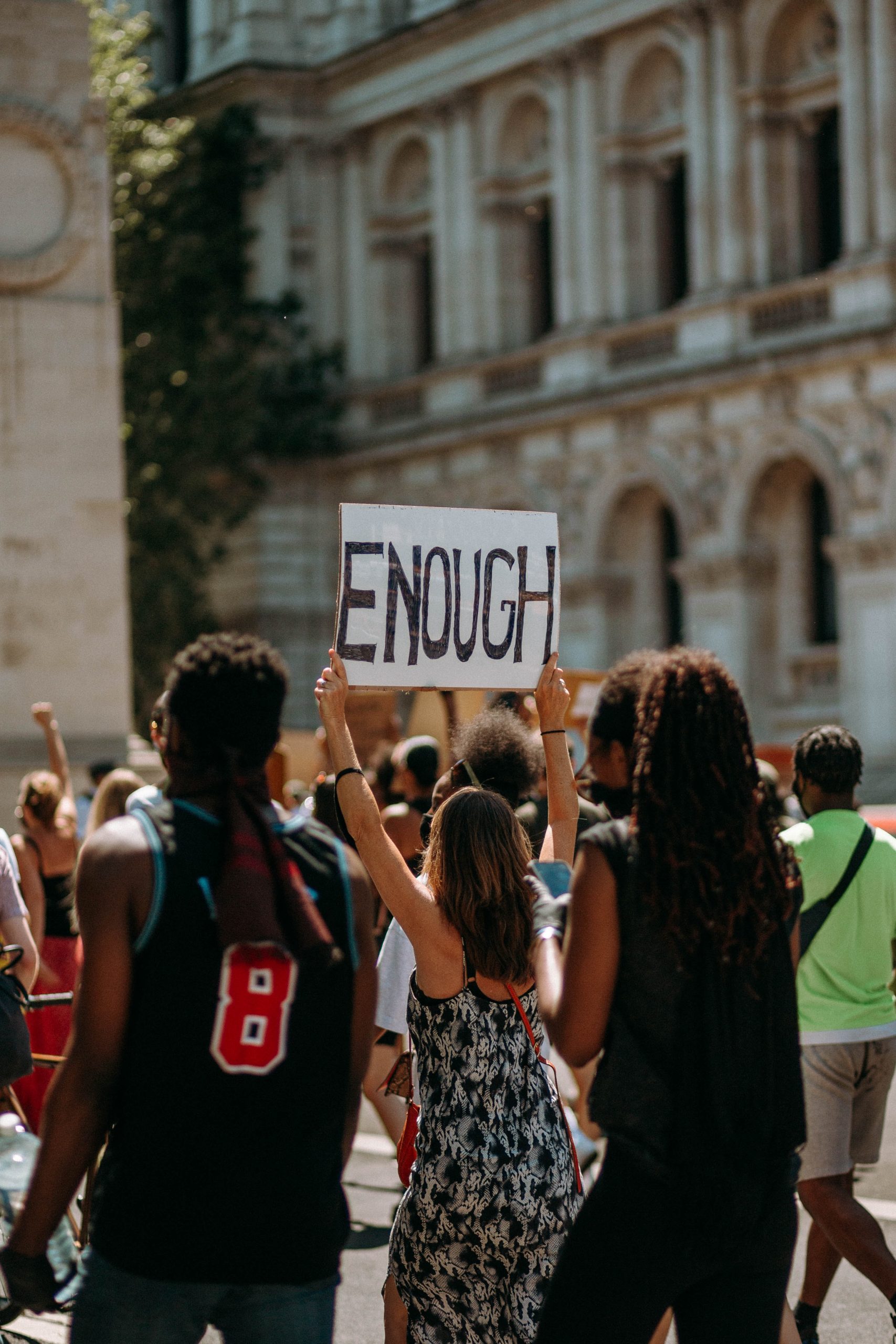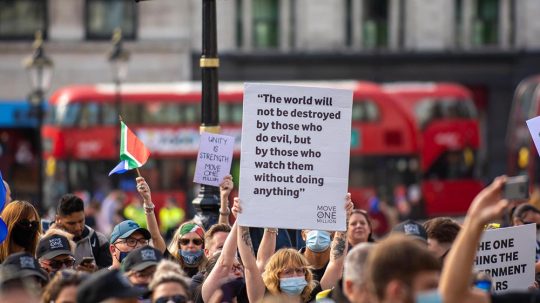A new report by ARTICLE 19 has revealed that two thirds of the world’s countries have imposed restrictions on the media during the pandemic. The UK also comes in for criticism in the report.
The Global Expression Report 2021 is a comprehensive, data-based analysis tracking freedom of expression across the world. Its erosion, hastened during the coronavirus pandemic, infringes on the right to free expression which is protected in the UK by Article 10 of the Human Rights Act.

Credit: Kristina V / Unsplash
Researchers at the charity ARTICLE 19 used 25 indicators (such as freedom of discussion, protest and public participation) to track freedom of expression in 161 countries. These factors were amalgamated to create a scale of 1 to 100 which places each country in one of five “expression” categories ranging from “In Crisis” to “Open”.
“The global pandemic has brought the world to a tipping point where governments and private actors face a stark choice,” said Quinn McKew, executive director of ARTICLE 19. “They must either commit to building a world based on rights to expression and information or they must become bystanders to the rapid decline in the freedoms that sustain robust and engaged societies.”
There are approximately 4.9 billion people living in countries identified in the report as either in crisis or with high levels of restrictions on freedom of expression. Some of the most significant deterioration was recorded in relation to freedom of assembly and public participation in decision-making, as well as demonstrations. Countries like Thailand and Belarus responded to protests with oppressive state responses. The report highlighted the impact this erosion of freedom has on journalists, who are at higher risk of violence, arrest and harassment.
Several policies knocked the UK down from a perfect score of 100 to 85. The government put forward troubling proposals that would increase the number of public institutions that can access communications data collected under the Investigatory Powers Act. The UK was also one of the countries that attacked and fired whistleblowers for reporting on dire situations encountered in the workplace.
“As is always the case in any country, the greatest threat to freedom of expression in the UK is the government,” said Sailesh Mehta, criminal barrister. “The more right-wing or authoritarian a government, the greater will be its inclination to control freedom of expression and freedom of protest, which are closely associated. These are important freedoms which are vital for a free and democratic society.”
In the UK, there are three recent bills that have the potential to infringe upon our right to freedom of expression.
The Draft Online Safety Bill

Credit: Sergey Zolkin / Unsplash
In recent years social media platforms such as Twitter and Facebook have been heavily criticised for their seeming inability to regulate trolling and misinformation. Concerns have been raised though about the Draft Online Safety Bill as a potential censorship tool in how citizens communicate online.
“What we want is specifics, for legislation to be as clear and specific as it possibly can be,” says Daniel Gorman, director of English PEN. “We start to get into difficult territory and possibly potentially dangerous territory when there is a lack of specifics in legislation. On an international level, we see this very frequently where there is legislation passed, which is open to interpretation, allowing for a much wider net to be cast. So in any legislation, we want it to be as specific and direct as possible”.
Gorman warns that the term “legal but harmful” in the proposed legislation is poorly defined.
“We feel that within this legislation, there’s still quite a lot of grey area,” he explains. “The ‘legal but harmful’ is one aspect of that. We are concerned about access to private communications and thinking through that, and potentially also encrypted communications. For many people we work with, including journalists and whistleblowers who have a strong need for encrypted communications, the lack of specifics and potential for overreach is concerning.”
The Higher Education (Freedom of Speech) Bill

Credit: Element5 Digital / Unsplash
Recent years have seen various stories about students de-platforming speakers at universities. The Higher Education (Freedom of Speech) Bill, in part a response to this, raises concerns about the policing of the content of education. ARTICLE 19 joined with Index On Censorship and English PEN to express their collective concern to Education Secretary Gavin Williamson in a public letter.
“What we want to try and think through is what is a useful way to engage in fostering a greater culture of expression in universities and to ensure that academics are free to express themselves in the best way possible.” says Daniel Gorman “We have some quite serious concerns about the current formulation of the higher education bill, in terms of how that is addressed.”
“We feel that these issues are best dealt with within universities themselves, and working with organisations to try and foster a climate that supports freedom of expression, we think that there can be essentially the use of a sledgehammer to crush a nut in terms of this bill,” he explains. “We’re concerned about this individual who will be the arbitrator of all decisions relating to free speech on campus, which is a government appointee.”
Under the bill, a ‘Freedom of Speech Champion’ would be appointed and individuals who have been non-platformed would be able to sue a university However, critics have suggested that no-platforming is far less of an issue than it is perceived to be.
The Police, Crime, Sentencing and Courts Bill

Credit: Liam Edwards / Unsplash
Protests have been a core part of a healthy democracy for centuries – and yet the pandemic has seen a crackdown on this fundamental right across the world, including in the UK. The Police, Crime, Sentencing and Courts Bill raised significant concerns over the curtailing of the right to protest, including harsher prison sentences for protestors.
“There’s specific provisions within the bill that are very concerning,” said Gorman. “One is the noise trigger, which people have talked about quite a lot. Having a noisy protest – or, in the context of the new statutory offence, a public nuisance causing annoyance – is something that is not clearly defined and is open to subjective interpretation. Anyone who’s familiar with protests knows that noise and things that some would consider an annoyance can be part and parcel of protest.”
How can citizens fight the erosion of free expression?
When asked what citizens can do to resist the threat of erosion of our freedom of expression, Mehta says: “These bills have the potential to significantly erode existing rights of protest and expression, giving the state wide powers of control. It is a golden rule of government that if a power can be used oppressively, it will eventually be. Once they are taken away, rights are rarely returned.”
Daniel Gorman concludes that this is a live, ongoing discussion that has not been made easier by lockdown. He said: “It’s been difficult, obviously, because we’ve been stuck in our boxes throughout Covid-19, so it’s been difficult to have those conversations. But one of the ways we do it is when we meet together in different places, including in protests and demonstrations, which is why it’s so important to push back on the policing bill.”






